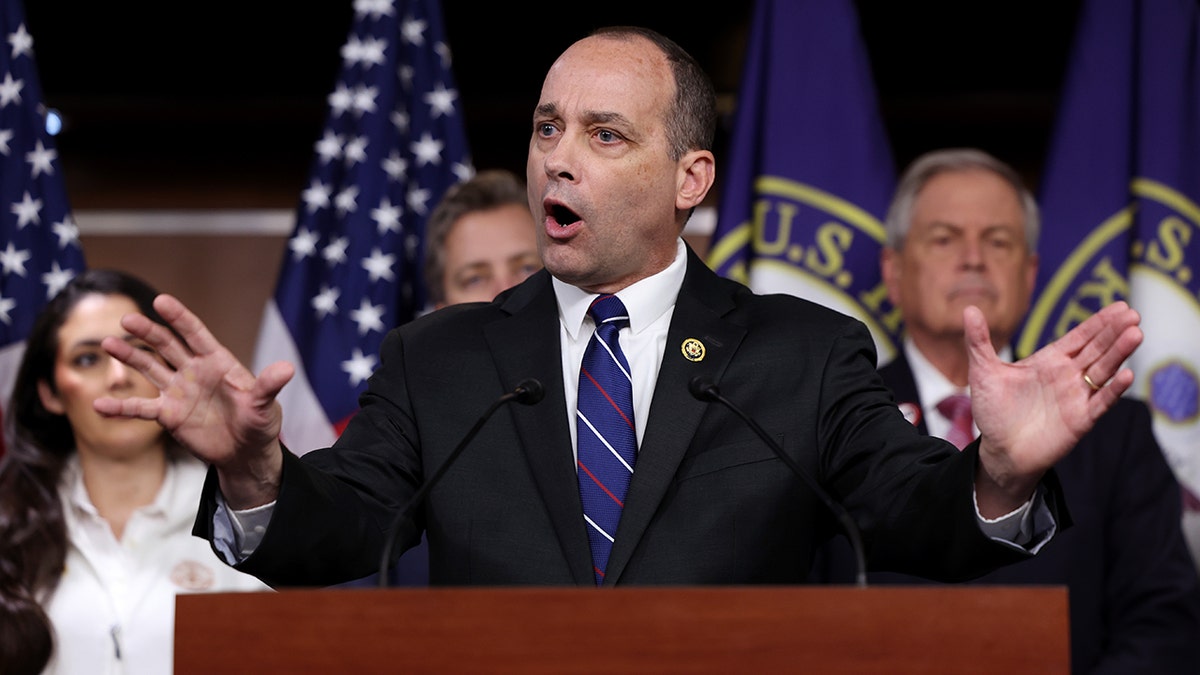House Republican lawmakers left a closed-door meeting Wednesday afternoon furious at their 19 Republican colleagues who blocked the chamber from advancing a bill to revamp a key federal government surveillance tool.
“When you have a majority, where members of the majority do not support the rules and procedures established by the majority, you are effectively handing control over to the minority party. And that is what these members are doing,” said Rep. Andy Barr. , R-Kentucky, told Fox News Digital.
It comes after a normally sleepy procedural vote, known as a rules vote, on a bill to amend and renew Section 702 of the Foreign Intelligence Surveillance Act failed 193 to 228 on Wednesday afternoon: the seventh time a rules vote has failed in this Congress. Before that, a vote on rules had not failed in two decades.
“This is what frustrates me: the same members who are tearing down this rule are loudly advocating for reform of FISA. There are 56 major reforms to FISA 702 that are incorporated into the base bill. I understand that they do not believe that those 56 reforms will go far enough… But by eliminating the rule and making it impossible to pass this basic reform bill, they will get nothing,” Barr said.
President Mike Johnson faced a major setback Wednesday when 19 members of his own party voted to block the advancement of a bill to renew a key surveillance tool. (Tom Williams/CQ-Roll Call, Inc via Getty Images and Beata Zawrzel/NurPhoto via Getty Images)
Conservative privacy hawks who rejected the bill were angry at how it was handled, including the exclusion of an amendment requiring safeguards for the purchase of U.S. citizens’ data from third-party data brokers.
But Rep. Greg Murphy, R.N.C., suggested the group’s tactics in House votes are missing their real goals.
“I think people make good, outstanding arguments. The problem is in the way you express it: if all you do is scream, no one listens to you anymore,” he said. “And I think a lot of good arguments can have merit, but when you cry like a wolf all the time, when everything is a no, you undermine your credibility.”
A vote on a rule would typically be along partisan lines, and even lawmakers who oppose the bill would vote to allow it to proceed if it were introduced by their own side. However, small factions of the slim Republican majority in the House of Representatives have used the rules votes as a weapon to kill their own party’s legislation as a form of protest against their leadership.
“What I heard there was that they were not angry with the underlying bill. The FISA bill itself included 56 reforms, all of that. That’s good,” another Republican lawmaker told Fox News Digital. “The reason they voted against the rule was not because of the FISA bill itself. It was the process. It was the amendments that they were not allowed to bring to the floor that really made them act against it.”
CASA SINKS JOHNSON-BACKED FISA RENEWAL AFTER TRUMP PUSH

Rep. Greg Murphy, R.N.C., accused his fellow Republican lawmakers of “crying wolf.” (Tom Williams/CQ-Roll Call, Inc via Getty Images)
Section 702 is a tool that allows the federal government to surveil non-Americans on foreign soil with suspected terrorist ties without a warrant, even if the person on the other end of their communications is an American.
The fight ahead of the April 19 deadline has put Chairman Mike Johnson, R-Louisiana, in a tough spot between the House Judiciary Committee and its allies, and the U.S. intelligence community and intelligence hawks. national security in Congress. The former have presented Section 702 as a tool of exploitation and privacy violation, while the latter have maintained that it is a critical and narrowly focused tool for preventing terrorist attacks.
Another issue for GOP hardliners has been Johnson’s opposition to a Republican-backed amendment to the judiciary that would force the federal government to seek a court order to look up data on a U.S. citizen.
FBI MISUSED UNSARANTEED SEARCH POWERS MORE THAN 278,000 TIMES IN 2021, FISA COURT FILING REVEALS
One of the 19 Republicans who scuttled the bill, House Freedom Committee Chairman Bob Good, R-Va., told reporters: “Some of us would rather see it expire than not be properly reformed.” .
But another Republican lawmaker who supports the bill argued that such an amendment would destroy the purpose of the tool.
They explained that if a suspected terrorist abroad communicates with a US citizen in your country, a Section 702 search would already detect their specific communications with that US citizen. The amendment would force authorities to seek a court order before viewing the content of that communication, which critics have warned could waste valuable time in the event of a serious threat.

House Freedom Caucus Chairman Bob Good was one of 19 Republicans who rejected the bill. (Kevin Dietsch/Getty Images)
Meanwhile, House Intelligence Committee Chairman Mike Turner, R-Ohio, suggested to reporters Wednesday afternoon that letting Section 702 expire on April 19 would have dire consequences, warning: “We We will go blind on April 20.”
FISA COURT OPINION REVEALS THAT A US SENATOR, A STATE SENATOR AND A STATE JUDGE ARE IN 702 CONSULTATIONS
“Unfortunately, there is a lot of misinformation about FISA. FISA is not a mass data collection program. It is not spying on Americans,” he continued. “It is collecting data from foreign nationals who are abroad and who represent a very small group of 250,000 who pose a threat to national security. Unfortunately, the proposed order would reduce our ability to view communications with people who… are in danger of national security, like the head of ISIS, head of Hamas, head of Al Qaeda, in an unviable structure.”
It is not immediately clear what House Republican leaders’ next steps would be. Several Republican lawmakers told Fox News Digital that considerations include a short-term extension of the current Section 702 program, which both sides of the argument have criticized as ripe for abuse, or being forced to accept the bill. of renewal of the Senate.
CLICK HERE TO GET THE FOX NEWS APP
Meanwhile, privacy hawks are pressing Johnson to allow as many votes on amendments on the bill as requested to ensure that all members have a say in shaping the bill, even if those amendments did not pass. the Senate controlled by Democrats.









